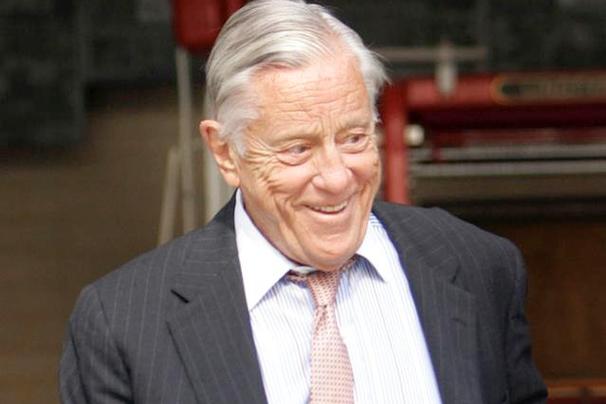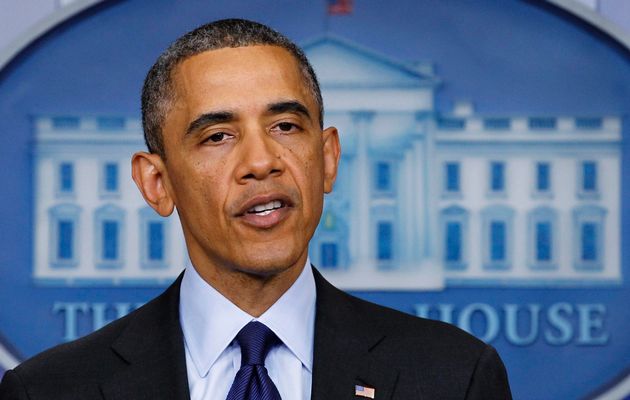Home Tags Posts tagged with "washington post"
washington post
Washington Post former editor Ben Bradlee, who played a key role in the Watergate scandal that toppled President Richard Nixon, has died aged 93.
According to the newspaper, Benjamin C. Bradlee died at his Washington home of natural causes.
As executive editor from 1968-1991, Ben Bradlee was credited for transforming the Post into one the most respected newspapers in America.
In 2013, Bed Bradlee was given the country’s highest civilian honor – the Presidential Medal of Freedom.
“For Benjamin Bradlee, journalism was more than a profession – it was a public good vital to our democracy,” President Barack Obama said in a statement released by the White House on Tuesday evening.
“A true newspaperman, he transformed the Washington Post into one of the country’s finest newspapers, and with him at the helm, a growing army of reporters published the Pentagon Papers, exposed Watergate, and told stories that needed to be told – stories that helped us understand our world and one another a little bit better.”
“Ben Bradlee was the best American newspaper editor of his time and had the greatest impact on his newspaper of any modern editor,” said Donald Graham, the former publisher of the Washington Post.

Ben Bradlee played a key role in the Watergate scandal that toppled President Richard Nixon
Ben Bradlee – who fought in the Navy during World War Two – became a reporter in the 1950s.
He soon became close friends with the then senator and future President John F. Kennedy.
Ben Bradlee became managing editor at the Washington Post in 1965 and was promoted to executive editor three years later.
“From the moment he took over The Post newsroom in 1965, Mr. Bradlee sought to create an important newspaper that would go far beyond the traditional model of a metropolitan daily,” the newspaper wrote in its obituary.
“He achieved that goal by combining compelling news stories based on aggressive reporting with engaging feature pieces of a kind previously associated with the best magazines.”
In 1971, Ben Bradlee decided to publish the so-called Pentagon Papers – a secret study of the Vietnam War broken by The New York Times.
Ben Bradlee acted against the advice of lawyers and the entreaties of top government officials. A legal battle then began, with the Supreme Court later upholding the right of newspapers to print the leaked papers.
He played a key role in toppling President Richard Nixon in 1974.
Ben Bradlee encouraged two journalists – Bob Woodward and Carl Bernstein – to pursue relentlessly the unfolding story in which some of Richard Nixon’s closest aides became involved in illegal activities, followed by a political cover-up in which the president himself was implicated.
The story of the newspaper’s coverage of the Watergate scandal was later portrayed in the film All The President’s Men, with Ben Bradlee played by Jason Robards.
[youtube 3esS3tQ7ujU 650]
Washington Post and The Guardian US have shared this year’s Pulitzer Prize for public service journalism for a series of stories on NSA electronic spying.
The publications’ reporting was based on documents leaked by former NSA contractor Edward Snowden.
Among other winners of the top prize in US journalism was the Boston Globe, for breaking news reporting.
Two staff writers of the Reuters news agency were awarded the prize for international reporting.
The Pulitzer Prizes are awarded by the Columbia University journalism school.
In giving the top prize to The Guardian and the Washington Post, the Pulitzer committee said the Guardian helped “through aggressive reporting to spark a debate about the relationship between the government and the public over issues of security and privacy”.
It said the Post’s stories were “marked by authoritative and insightful reports that helped the public understand how the disclosures fit into the larger framework of national security”.
Edward Snowden, in a statement published by The Guardian, called the award “a vindication for everyone who believes that the public has a role in government.

Edward Snowden’s NSA leaks earned Pulitzer Prize for The Guardian and Washington Post
“We owe it to the efforts of the brave reporters and their colleagues who kept working in the face of extraordinary intimidation,” added Edward Snowden, who has been charged with espionage in the US and is currently a fugitive in Russia.
Meanwhile, the Boston Globe provided “exhaustive and empathetic coverage of the Boston Marathon bombings and the ensuing manhunt that enveloped the city”, the committee wrote of the paper’s coverage of the April 15, 2013 attack.
Chris Hamby of the Center for Public Integrity was awarded a Pulitzer for his reporting on how lawyers and doctors conspired to deny benefits to coal miners stricken with black lung disease.
The top prize for US reporting was awarded to The Gazette in Colorado for its examination of mistreatment of wounded combat veterans, while the prize for international reporting went to Reuters for reports of persecution of a Muslim minority group in Burma, also known as Myanmar.
The editorial staff of the Oregonian in Portland won the prize for commentary for pieces explaining pension costs.
Tyler Hicks of the New York Times won for breaking news photography for images captured during a terrorist attack at Westgate Mall in Kenya. Also for the Times, Josh Haner won in the feature photography category for a “moving” essay on a Boston Marathon bomb blast victim who lost most of both legs.
Among other categories, Donna Tartt, author of The Goldfinch, was awarded the Pulitzer for fiction writing, while Don Fagin received the award for general nonfiction for his work, Tom’s River: A Story of Science and Salvation.
Members of this year’s selection committee included Katherine Boo, a staff writer for The New Yorker, and Eugene Robinson, a columnist for The Washington Post.
[youtube SDmFC6av7t8 650]
[youtube Yp-uqXdQJEA 650]
The files disclosed by leaker Edward Snowden to the Washington Post revealed the multi-billion dollar “black budget” used by US intelligence.
The CIA’s budget is the most expensive, $14.7 billion out of $52.6 billion in total for 16 intelligence agencies, according to the files.
Two of those agencies are also actively hacking into foreign computer networks, reports the Washington Post.
The US has not made public a breakdown of the total intelligence budget.
The newspaper published charts detailing the budget, but did not post all the documents, citing “sensitive details” after US officials expressed concerns about risks to methods and sources.
According to the Washington Post, the CIA’s budget has grown more than 50% since 2004.
The files also reportedly show the budget of the National Security Agency (NSA), America’s electronic spying organization – it apparently requested $10.8 billion for 2013, making it second only to the CIA.
Nearly $5 billion of the CIA’s budget is allocated to human intelligence operations, with almost $67 million of that total reserved for funding the false identities of its overseas spies, according to the files.

The files disclosed by leaker Edward Snowden to the Washington Post revealed the multi-billion dollar “black budget” used by US intelligence
The CIA and the NSA have also launched “offensive cyber operations” to hack into or sabotage enemy computer networks, according to the files.
The documents reportedly refer to China, Russia, Iran, Cuba and Israel as “priority” counterintelligence targets. Israel is an American ally, though it has previously conducted espionage against the US.
The NSA is denying one part of Friday’s report – that the agency planned to investigate up to 4,000 cases of possible internal security breaches before Edward Snowden made his disclosures to the media.
Vanee Vines, an agency spokesman, told the Associated Press the effort actually represented a broad reinvestigation of civil personnel to lessen the possibility of security risks.
“Periodic reinvestigations are conducted as one due-diligence component of our multifaceted insider threat programme,” he said.
The documents are the latest in a series of leaks by ex-NSA contractor Edward Snowden, who has been charged with espionage in a federal court in the US.
Edward Snowden is currently in Russia, where the government of Vladimir Putin has granted him a year’s asylum.
[youtube mxtjbSLsYoI]
Documents leaked by Edward Snowden revealed that the National Security Agency (NSA) broke privacy rules and overstepped its legal authority thousands of times in the past two years.
The incidents resulted in the unauthorised electronic surveillance of US citizens, according to documents published by the Washington Post.
Edward Snowden, 30, a former NSA contractor, has leaked top secret documents to the US and British media.
He has been given asylum in Russia.
On Thursday, the Washington Post posted on its website a selection of documents it said had been provided by Edward Snowden, who fled the US in June after providing documents detailing NSA surveillance programmes to the Guardian and Washington Post newspapers.
The documents purport to show that the unauthorised interception of telephone calls and emails of Americans and foreign nationals on US soil resulted from errors and departures from standard agency processes, including through a data collection method that a secret US surveillance court later ruled unconstitutional.
The documents offer more detail into the agency practices than is typically shared with members of Congress, the US justice department, and the Office of the Director of National Intelligence.

The NSA broke privacy rules and overstepped its legal authority thousands of times in the past two years
An internal audit dated May 2012 counted 2,776 incidents over the previous 12 months of unauthorised data collection. The rate of violations grew significantly each quarter, from 546 in the second quarter of 2011 to 865 in the first quarter of 2012.
It is unclear how many individuals were subjected to unauthorised surveillance.
NSA auditors speculated the number of incidents jumped in the first quarter of 2012 because a large number of Chinese surveillance targets visited the US for the Chinese New Year. NSA surveillance of foreign nationals while they are on US soil is restricted.
According to an internal NSA audit report detailing the incidents in the first quarter of 2012, the majority occurred due to “operator error”, usually from failure to follow procedures, typographical errors, insufficient research information, or workload issues.
Other incidents were attributed to “system error”, such as a lack of capabilities or glitches and bugs.
Some data was intercepted when foreign targets entered the US – where NSA surveillance is restricted – but the system was unaware the target had entered US soil.
Other “inadvertent collection incidents” were targets believed to be non-Americans but who turned out to be US citizens upon further investigation.
In one instance in 2008, a “large number” of calls placed from Washington DC were intercepted after an error in a computer program entered “202” – the telephone area code for Washington DC – into a data query instead of “20”, the country code for Egypt.
In another case, the agency vacuumed up vast amounts of international data from a fibre optic cable running through the US into an NSA computer, where it was stored and analysed. Months later, the secret Foreign Intelligence Surveillance Court ruled the programme violated the search and seizure protections afforded by the US constitution.
Edward Snowden has been charged with espionage in a federal court in the US. He is currently in Russia, where the government of Vladimir Putin has granted him a year of asylum on the condition he cease disclosing secret US government information.
President Barack Obama has defended the series of programmes described in Edward Snowden’s leaks, but has promised reforms to guarantee greater oversight.
“Given the history of abuse by governments, it’s right to ask questions about surveillance, particularly as technology is reshaping every aspect of our lives,” Barack Obama said last week.
[youtube vnl_7XF2814]
It appears the Washington Post on Friday revised the story about Barack Obama’s trip to Africa with no note to the reader about the changes.
The Washington Post on Thursday reported the White House canceled Barack Obama’s Tanzanian safari “following inquiries” from the paper “about the trip’s purpose and expense” – but the version online and in print on Friday offers a different take with no clarification or note that the story has been updated and changed.
In the first version, there’s a direct connection between the Washington Post’s inquiries and the canceled safari – and in the updated version, that link is no longer directly made. Readers to the item, meanwhile, were not told that any information in the story had been revised. The story states “published: June 13,” but not that it was updated and revised.
“Obama’s trip to Africa could cost $60 million to $100 million based on the costs of similar African trips in recent years, according to one person familiar with the journey,” the Washington Post reported.
In the first version of the story, posted online on Thursday, the reporters stated: “The president and first lady had also planned to take a Tanzanian safari as part of the trip, which would have required the president’s special counter-assault team to carry sniper rifles with high-caliber rounds that could neutralize cheetahs, lions or other animals if they became a threat, according to the planning document. But the White House canceled the safari on Wednesday following inquiries from The Washington Post about the trip’s purpose and expense, according to a person familiar with the decision.”
Friday’s version of the story – both online and in print – has the same set-up in the section about the canceled Tanzanian safari, but no longer includes the line that the White House canceled the trip following their inquiries. Instead, the story now reads that officials said the safari had been canceled in favor of a trip to Robben Island.
“When The Post first asked White House officials about the safari last week, they said no final decision had been made,” the story reads.
“A White House official said Thursday that the cancellation was not related to The Post’s inquiries.”
Spokesman Josh Earnest told the newspaper: “We do not have a limitless supply of assets to support presidential missions, and we prioritized a visit to Robben Island over a two-hour safari in Tanzania. Unfortunately, we couldn’t do both.”

It appears the Washington Post revised the story about Barack Obama’s trip to Africa with no note to the reader about the changes
The Washington Post, however, notes that “internal administration documents circulated in April show that the Obama family was scheduled to go to both Robben Island and the safari park, according to a person familiar with the plans.”
The story does not include any indication that it was revised and updated.
Document: Major resources needed for Obama Africa trip is currently #1 on the Washington Post’s “most popular” list for Politics.
[youtube ElvOUbhpOek]
President Barack Obama’s trip to Africa this month could cost the tax payers anywhere from $60 million to $100 million, according to the Washington Post, which obtained an internal planning document for the travel itinerary.
At the end of June, President Barack Obama and his family will take an eight-day trip to sub-Saharan Africa, making stops in Senegal, Tanzania, and South Africa in the name of reinforcing U.S. commitment to forging strong relationships with emerging democracies in the region.
Barack Obama will hold meetings with “a wide array of leaders from government, business, and civil society, including youth,” according to a White House press release announcing the trip, and seek to “underscore the [his administration’s] commitment to broadening and deepening cooperation between the U.S. and the people of sub-Saharan Africa to advance regional and global peace and prosperity.”
Presidential trips to foreign countries tend to be expensive in any administration: According to the Washington Post, former President Bill Clinton’s 1998 trip to Africa racked up a bill of at least $42.7 million, not including what were likely significant Secret Service costs. For his part, former President George W. Bush and his wife, Laura, took two trips to Africa in 2003 and 2008, involving significant resources as well. But there are also paper reports that, due to “a confluence of factors,” Barack Obama’s three-country trip could be “one of the most expensive” of his presidency.
“Obama’s trip could cost the federal government $60 million to $100 million based on the costs of similar African trips in recent years, according to one person familiar with the journey, who was not authorized to speak for attribution,” the Washington Post reported. The paper said that it received the internal planning document from a “person who is concerned about the amount of resources necessary for the trip.”

President Barack Obama’s trip to Africa this month could cost the tax payers anywhere from $60 million to $100 million
According to the Washington Post, the expenses listed on the document include: “Hundreds of U.S. Secret Service agents will be dispatched to secure facilities in Senegal, South Africa and Tanzania. A Navy aircraft carrier or amphibious ship, with a fully staffed medical trauma center, will be stationed offshore in case of an emergency.
“Military cargo planes will airlift in 56 support vehicles, including 14 limousines and three trucks loaded with sheets of bulletproof glass to cover the windows of the hotels where the first family will stay. Fighter jets will fly in shifts, giving 24-hour coverage over the president’s airspace, so they can intervene quickly if an errant plane gets too close.”
Other sources of expense include the use of 56 vehicles and hundreds of Secret Service agents, according to the Washington Post. The document, however, did not note specific prices.
President Barack Obama and First Lady Michelle Obama had reportedly been planning to go on a safari in Tanzania, but the Washington Post says that trip was canceled after reporters inquired into the cost and purpose of the trip.
At a press briefing on Friday, White House spokesman Ben Rhodes defended the trip, noting that “we have not traveled to Africa in the same way that we’ve traveled to other regions in the world” and that “Africa’s a critically important region of the world.”
“We have huge interests there… So for the United States to say, <<We’re a world leader except in this continent>> doesn’t make any sense,” Ben Rhodes told reporters.
“From a foreign policy perspective, in some respects, people believe this trip is overdue. And, frankly, there will be a great bang for our buck for being in Africa, because when you travel to regions like Africa that don’t get a lot of presidential attention, you can have very long-standing and long-running impact from the visit.”
[youtube 1_2vgLNfrk0]
Former Republican candidate Mitt Romney has retreated into “seclusion” after his failed presidential run and has so little to do he is offering to change bedpans for sick friends to ease his boredom.
In a huge step down from the campaign trail, Mitt Romney is said to have reached out to a friend going through a liver transplant and offered to care for him.
Gone are Mitt Romney’s daily briefings with top aides and Secret Service entourage – now he spends his days alone on his iPad as he grapples with crushing disappointment.
An article in the Washington Post paints a picture of a man going through the awful low that presidential candidates have to deal with after they lose – in his case after six years of campaigning.
Exacerbating Mitt Romney’s plight is that unlike other failed contenders like John McCain and John Kerry, he does not have a job in the Senate to go back to.
Mitt Romney has also had to endure seeing wife Ann, who publicly admitted the campaign was very hard on her, cry in private as she takes it even worse than him.
According to the Washington Post, Ann and Mitt Romney thought it was their destiny to end up in the White House but are instead dealing with the wreckage of what went wrong.
Mitt Romney, 65, is holed up in his mansion on the seafront in La Jolla, an exclusive area of San Diego in California, taking visits from business colleagues and friends.
He has been going on bike rides to stay fit and recently welcomed his family to the home for Thanksgiving but ordered dinner from Boston Market as there were too many relatives to cook for them all.
Plans to renovate the home have been put on hold and the only construction going ahead is at Mitt Romney’s neighbor’s mansion.

Mitt Romney has retreated into seclusion after his failed presidential run and has so little to do he is offering to change bedpans for sick friends to ease his boredom
Mitt Romney also spends a lot of time emailing friends and wrote to the one going through the liver transplant: “I’ll change your bedpan, take you back and forth to treatment.”
His adviser, Ron Kaufman said: “Is he disappointed? Of course he’s disappointed. He’s like 41.”
The reference is to President George H.W. Bush, who lost his reelection bid in 1992 to Bill Clinton.
“Forty-one would hate to lose a game of horseshoes to the gardener in the White House, and Mitt hates to lose. He’s a born competitor.”
Mitt Romney has ruled out taking up another position within the Republican party because of the way it treated him after the election.
When he claimed that President Barack Obama won a second term because of “gifts” he bestowed on the minorities, the Republican leadership effectively exiled him.
Now Mitt Romney is said to be considering a Clinton Global Initiative style organization which would allow him to do some good.
Robert Shrum, a senior strategist on Democratic presidential campaigns, said: “Nothing so unbecame his [Mitt Romney’s] campaign as his manner of leaving it.
“I don’t think he’ll ever be a significant figure in public life again.”
Recent pictures of Mitt Romney looking haggard do not tell the truth, friends say, and Romney is not letting himself go or holding a grudge.
Bitterness is “not in the Romney genetic code”, the Washington Post claims, and the worst thing he is going through right now is seeing Ann Romney so upset she can barely ride her beloved horses.
During the campaign Ann Romney, 63, who suffers from MS, attacked those who were criticizing the Romney camp and in one outburst said: “Stop it. This is hard. You want to try it? Get in the ring.”
John Miller, a meatpacking magnate who co-chaired Mitt Romney’s finance committee and owns the beach house next door, said Romney was not a poor loser, but confirmed he was struggling.
He said: “He’s not crying on anybody’s shoulders.
“He’s not blaming anybody…He’s doing a lot of personal introspection about the whole process – and I’m not even sure that’s healthy.
“There’s nothing you can do about it now.”







